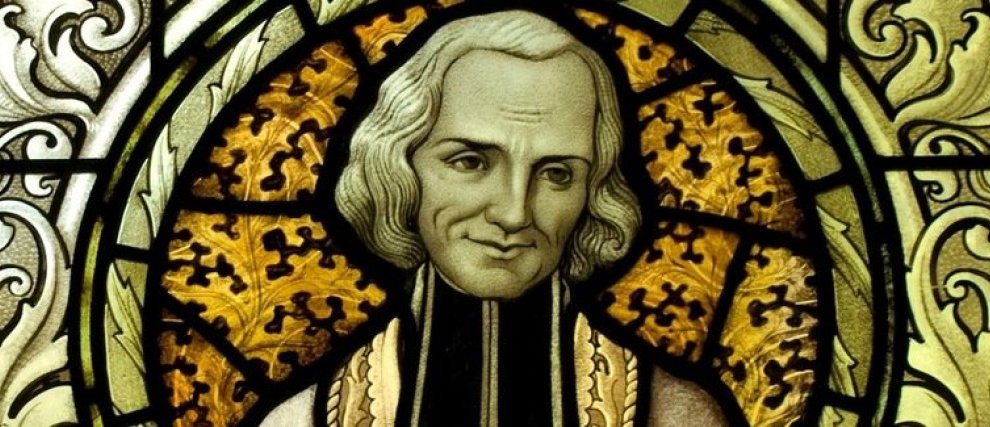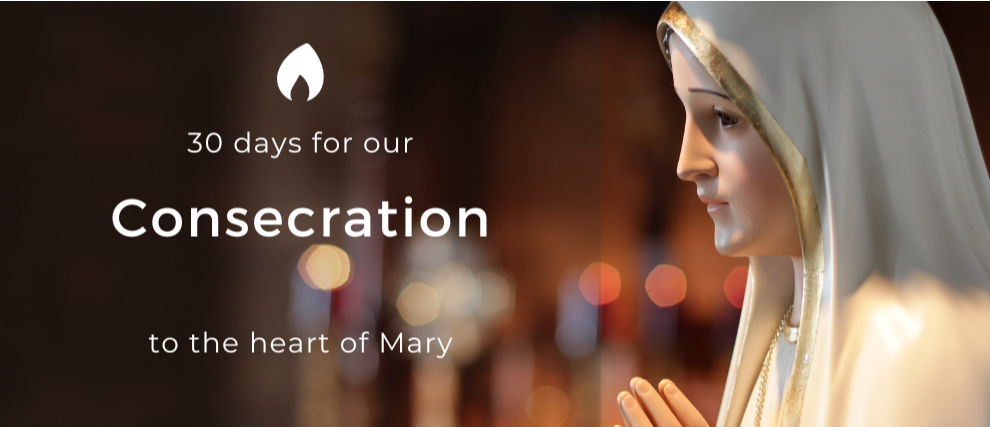The Holy Parish Priest of Ars
Biography of Saint John Vianney
Jean-Marie Vianney was born in Dardilly, near Lyon, on May 8, 1786. His parents were peasants of solid faith. He learned about Christian life from his mother and showed a keen interest in the Lord and the Virgin Mary at a very young age. At the age of nine, he went to school in Dardilly, but didn’t stay long because he was more useful in agricultural work. Deeply marked by the revolution, little Jean-Marie took his first communion and first confession in secret.
At the age of seventeen, he expressed his desire to become a priest. His mother was very happy, but his father could not allow it because his work was needed on the farm. After two years, John’s father relented, but John did not have the necessary education to enter seminary. Abbé Balley, parish priest of Ecully, took the young man under his protection and thanks to him, he could begin his training. Throughout his studies, the young Jean-Marie was pious, humble and animated by a great spirit of penance, but he experienced many difficulties at school, particularly in memorizing Latin. He undertook a pilgrimage to La Louvesc at the tomb of Saint Jean-François Régis, where he received the grace to finish his studies. In 1807, he received confirmation and took Saint John the Baptist as his patron. In 1809, Jean-Marie was drafted to join Napoleon’s army, but thanks to a combination of circumstances he could not go to the front. In 1811, he received the tonsure and left for the minor seminary of Verrières.
He was ordained a priest on 13 August 1815 at the age of 29 and was appointed curate at Ecully. In 1818, the bishop appointed him parish priest at Ars, and immediately began his task of converting his parishioners to a holy life. The parish priest of Ars would not cease to call his faithful to order, inviting them constantly to reject sin. He became known for his harsh sermons and was therefore slandered and persecuted. Yet in Ars the parish was completely renewed. The holy priest founded a school and then an orphanage called “Providence” in the village, and several miracles occurred there.
While living in extreme poverty, the parish priest of Ars was anxious to embellish his church with renovations and decorations. He put all his care to the celebration of Mass and Ars was renowned for the beauty of his services, the processions of the Feast of God had an exceptional brilliance. For thirty years, the parish priest Vianney was attacked by the devil, whom he called the “hook”. At the end of his life, the crowds flocked to Ars, up to 120,000 people a year. The influence of this man, already called a saint, grew. Many travelers wished to confess to Father Vianney, who spent up to fifteen hours per day in his confessional. Like Saint Padre Pio, he was known for having the gift of reading souls. He caused many miracles through the intermediary of Saint Philomena, “his little saint”.
After working tirelessly for more than forty years, eating and sleeping extremely little, he died on August 4th, 1859, in Ars-sur-Formans.
The miracles of the parish priest of Ars
The holy parish priest of Ars was a man of prayer and penance. By this he obtained many graces. Many extraordinary facts that took place through his intercession have been reported. He confided to a friend: “I got from God everything I wanted, for myself as well as for others.”
Multiplications at the orphanage
One day, when the orphanage had no dough left to prepare bread, he sent the cook to knead what was left, and the dough miraculously multiplied. Another time, it was the grain silo that was empty, and the holy priest placed a relic of Saint Jean-François Régis on a small pile of wheat. He was soon called to see the miracle, as the door could no longer open due to the fact that the attic was full of wheat.
Miraculous Healing
Several times, the holy priest brought miraculous healing. This was the case for a paralyzed little boy. Father Vianney sent his mother to pray to Saint Philomena in the chapel, and when he returned the little boy was running.
The story of the parish priest of Ars after his death
The body of the parish priest of Ars
The body of the holy parish priest of Ars is now on display in a wax mask in the basilica of Ars. He was found uncorrupted when his tomb was opened following his beatification. Visiting of his house in Dardilly, one can read a note where the holy parish priest asks to be buried in the family tomb in the cemetery of Dardilly. At the wax museum of Ars, there is a second note where the parish priest says to leave his body to the bishop after his death. That is why he was first buried in the parish church of Ars. The church of Saint Jean-Marie Vianney in Dardilly has a relic of the saint's arm exposed in a reliquary. A small wax bust of Saint Jean-Marie Vianney was made during his lifetime by the sculptor Cabuchet. In 1867, he made the famous marble statue that is now in the Basilica of Ars.
The Canonization of Saint Jean-Marie Vianney
On January 8, 1905 Pope Pius X proclaimed the beatification of John Vianney, who he declared “patron of all the parish priests of France”. He was canonized by Pius XI on May 31, 1925 who this time declared him “patron of all the parish priests of the universe” in 1929.
The Fame of Ars
A Carmelite convent was founded in Ars, where the nuns pray constantly for the holiness of the priests. Today, Ars is an important place of pilgrimage; Pope John Paul II visited it on October 6, 1986. In this city, retreats are organized for priests and faithful. The small town of the holy parish priest has become the prayerful heart of the secular Community of Chemin Neuf.
Sermons, quotations and prayers of the holy parish priest of Ars
The parish priest of Ars deeply touched hearts with his words. He is famous for his memorable sermons, many of which have been often quoted. Here are the main themes of his homilies:
- The Virgin Mary
- Prayer
- The Confession and Mercy of God
- The Sacrament of the Eucharist and Communion
- The Priesthood of the Priest
There are many prayers to the parish priest of Ars. Saint Jean-Marie Vianney was already known during his lifetime to obtain much from God. Today, he is still sought by many Christians to obtain the Lord's help. One can pray the
, the prayer through the intercession of the holy parish priest of Ars and of Saint Philomena, the act of love of the holy parish priest, the prayer for priests, or the prayer for vocations. There is also the prayer of the rosary, each mystery of the rosary, joyful, painful and glorious mysteries are meditated with the help of the words of the parish priest of Ars.
